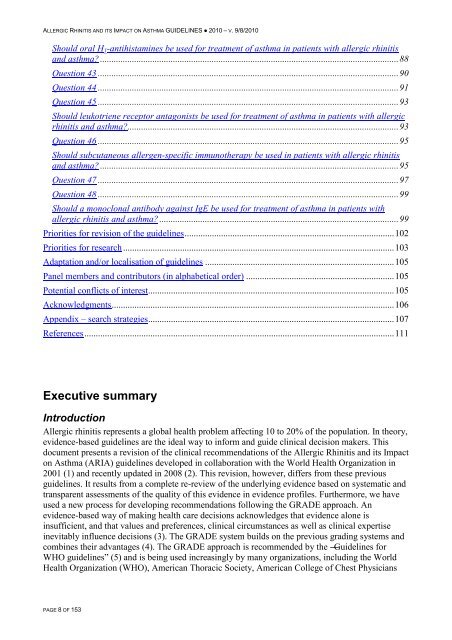Allergic Rhinitis and its Impact on Asthma - ARIA
Allergic Rhinitis and its Impact on Asthma - ARIA
Allergic Rhinitis and its Impact on Asthma - ARIA
Create successful ePaper yourself
Turn your PDF publications into a flip-book with our unique Google optimized e-Paper software.
ALLERGIC RHINITIS AND ITS IMPACT ON ASTHMA GUIDELINES ● 2010 – V. 9/8/2010<br />
Should oral H1-antihistamines be used for treatment of asthma in patients with allergic rhinitis<br />
<str<strong>on</strong>g>and</str<strong>on</strong>g> asthma? ................................................................................................................................... 88<br />
Questi<strong>on</strong> 43 .................................................................................................................................... 90<br />
Questi<strong>on</strong> 44 .................................................................................................................................... 91<br />
Questi<strong>on</strong> 45 .................................................................................................................................... 93<br />
Should leukotriene receptor antag<strong>on</strong>ists be used for treatment of asthma in patients with allergic<br />
rhinitis <str<strong>on</strong>g>and</str<strong>on</strong>g> asthma?....................................................................................................................... 93<br />
Questi<strong>on</strong> 46 .................................................................................................................................... 95<br />
Should subcutaneous allergen-specific immunotherapy be used in patients with allergic rhinitis<br />
<str<strong>on</strong>g>and</str<strong>on</strong>g> asthma? ................................................................................................................................... 95<br />
Questi<strong>on</strong> 47 .................................................................................................................................... 97<br />
Questi<strong>on</strong> 48 .................................................................................................................................... 99<br />
Should a m<strong>on</strong>ocl<strong>on</strong>al antibody against IgE be used for treatment of asthma in patients with<br />
allergic rhinitis <str<strong>on</strong>g>and</str<strong>on</strong>g> asthma? ......................................................................................................... 99<br />
Priorities for revisi<strong>on</strong> of the guidelines ............................................................................................ 102<br />
Priorities for research ....................................................................................................................... 103<br />
Adaptati<strong>on</strong> <str<strong>on</strong>g>and</str<strong>on</strong>g>/or localisati<strong>on</strong> of guidelines ................................................................................... 105<br />
Panel members <str<strong>on</strong>g>and</str<strong>on</strong>g> c<strong>on</strong>tributors (in alphabetical order) ................................................................. 105<br />
Potential c<strong>on</strong>flicts of interest ............................................................................................................ 105<br />
Acknowledgments ............................................................................................................................ 106<br />
Appendix – search strategies ............................................................................................................ 107<br />
References ........................................................................................................................................ 111<br />
Executive summary<br />
Introducti<strong>on</strong><br />
<str<strong>on</strong>g>Allergic</str<strong>on</strong>g> rhinitis represents a global health problem affecting 10 to 20% of the populati<strong>on</strong>. In theory,<br />
evidence-based guidelines are the ideal way to inform <str<strong>on</strong>g>and</str<strong>on</strong>g> guide clinical decisi<strong>on</strong> makers. This<br />
document presents a revisi<strong>on</strong> of the clinical recommendati<strong>on</strong>s of the <str<strong>on</strong>g>Allergic</str<strong>on</strong>g> <str<strong>on</strong>g>Rhinitis</str<strong>on</strong>g> <str<strong>on</strong>g>and</str<strong>on</strong>g> <str<strong>on</strong>g>its</str<strong>on</strong>g> <str<strong>on</strong>g>Impact</str<strong>on</strong>g><br />
<strong>on</strong> <strong>Asthma</strong> (<strong>ARIA</strong>) guidelines developed in collaborati<strong>on</strong> with the World Health Organizati<strong>on</strong> in<br />
2001 (1) <str<strong>on</strong>g>and</str<strong>on</strong>g> recently updated in 2008 (2). This revisi<strong>on</strong>, however, differs from these previous<br />
guidelines. It results from a complete re-review of the underlying evidence based <strong>on</strong> systematic <str<strong>on</strong>g>and</str<strong>on</strong>g><br />
transparent assessments of the quality of this evidence in evidence profiles. Furthermore, we have<br />
used a new process for developing recommendati<strong>on</strong>s following the GRADE approach. An<br />
evidence-based way of making health care decisi<strong>on</strong>s acknowledges that evidence al<strong>on</strong>e is<br />
insufficient, <str<strong>on</strong>g>and</str<strong>on</strong>g> that values <str<strong>on</strong>g>and</str<strong>on</strong>g> preferences, clinical circumstances as well as clinical expertise<br />
inevitably influence decisi<strong>on</strong>s (3). The GRADE system builds <strong>on</strong> the previous grading systems <str<strong>on</strong>g>and</str<strong>on</strong>g><br />
combines their advantages (4). The GRADE approach is recommended by the ―Guidelines for<br />
WHO guidelines‖ (5) <str<strong>on</strong>g>and</str<strong>on</strong>g> is being used increasingly by many organizati<strong>on</strong>s, including the World<br />
Health Organizati<strong>on</strong> (WHO), American Thoracic Society, American College of Chest Physicians<br />
PAGE 8 OF 153


